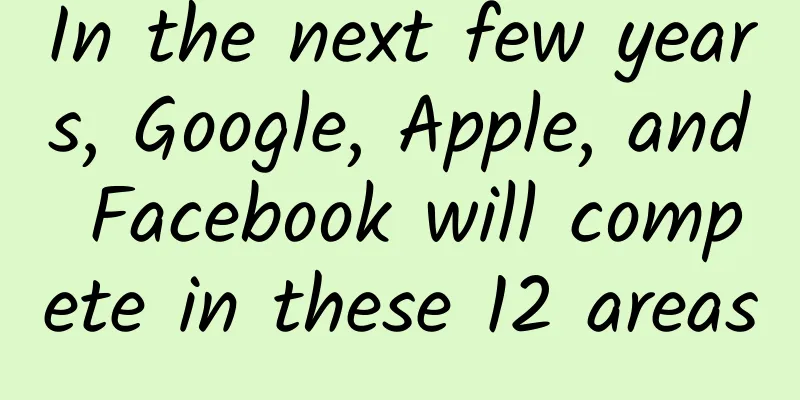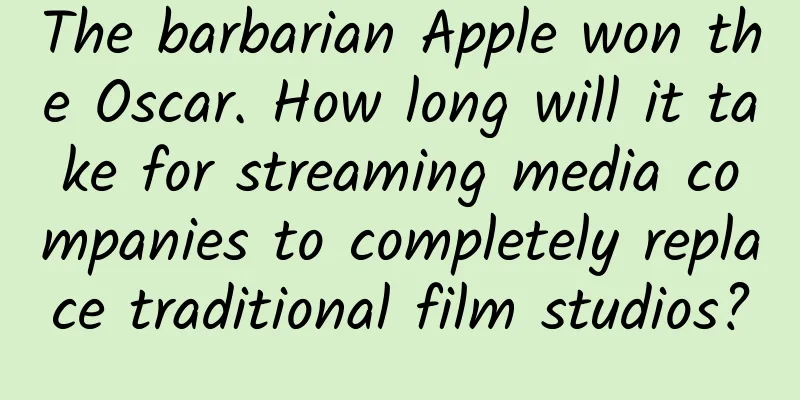In the next few years, Google, Apple, and Facebook will compete in these 12 areas

|
It’s not difficult for a person to occasionally provide others with an insightful idea, but it’s not easy to produce insightful ideas continuously. In my opinion, Andreessen Horowitz investor Benedict Evans belongs to the latter category.
On Twitter, in addition to being an a16z employee, Benedict Evans is also known for his deep observations on the mobile industry and consumer electronics technology. His personal newsletter that aggregates information about the technology industry has more than 36,000 subscribers. As far as I know, Wang Junyu, CEO of Wandoujia, is also one of the loyal readers. In his self-introduction, Benedict Evans described himself as follows: I try to work out what's going on, and what happens next. Recently, Benedict Evans talked about some boring debates in the technology industry on his Twitter, and some changes that have not yet been finalized but may affect the way you and I control mobile devices in the future. Technology giants like Google, Apple, Facebook, and Microsoft will inevitably have to fight in these unfinished changes. The puzzle above is Benedict Evans' list of boring and interesting changes in the technology industry. In order to save the interesting stuff for later, let's take a look at the boring topics first. In Benedict Evans's view, platform competition, Windows, openness, betting on Moore's Law, privacy, and someone is doing evil are no longer interesting topics. I think Benedict Evans's view may be that when people talk about these topics, they are often just verbal disputes, and will not bring meaningful innovations in the user and consumer electronics technology evolution levels. The 12 interesting points on the right are expected to truly affect the way you and I use mobile devices, as well as the mobile network life of more ordinary people. Messaging: Instant messaging application This part is actually talking about instant messaging applications such as WhatsApp, WeChat, LINE, and Snapchat. Whether in China or the United States, the huge value of such products is obvious to all. Now, such products include WhatsApp, which adheres to the principle of simplicity, and WeChat and Facebook Messenger, which adopt a platform strategy. How will these two paths evolve? How will these IM products, sandwiched between mobile operating systems and users, rely on their dominant position to influence the interaction between operating systems and users? How will Apple and Google rely on their own system advantages to regain control of users? These topics are much more interesting than verbal disputes. New UX models: New human-computer interaction models From a macro perspective, somatosensory and virtual reality devices are expected to enter the lives of ordinary people in the future, which is fundamentally different from the current interaction with machines using keyboards, touch screens and voice. From a micro perspective, the improvement of machine learning capabilities and the exploration of operating systems in blending mobile devices and desktop devices are also expected to give rise to new human-computer interaction modes. Productivity, & MSFT: Productivity tools and Microsoft Although Benedict Evans thinks Windows is a boring topic, he is very interested in the relationship between Microsoft and productivity tools. In addition to platformizing its own product Office, Microsoft has successively purchased the email application Acompli, the calendar application Sunrise, and the list application Wunderlist at high prices. How will Microsoft, which has missed the mobile opportunity and has no mobile users, use productivity tools to build an efficiency platform for itself on the mobile side to gather users? Android control: Android control Android control is actually an old topic. After the initial open growth, Google began to integrate many functions into the closed-source software Google Play Services to tighten its control over Android. However, with Microsoft's investment in CyanogenMod, Google is also facing new challenges in its control over Android. Of course, if you are interested in forking Android, you can actually read this article. In the author's opinion, as long as Google still contributes the majority of the code to the open source Android system, it is unrealistic for any manufacturer that still uses Android to completely get rid of Google's control. Search, Discovery, Suggestion: Search, Discovery, Suggestion Although search is no longer as dominant on mobile devices as it is on desktops, it is still a high-frequency user demand. On mobile devices, Google started trying to index in-app content very early on, and Facebook and Apple later came up with their own solutions. How this product will evolve on mobile devices in the future is naturally closely related to users. A long time ago, Google had a vision that users don't need to search, Google will automatically push what users want to them, and with the advancement of machine learning and artificial intelligence technology, this vision has gradually become possible. Machine autonomous discovery and suggestion capabilities are being used more and more on iOS and Android devices. On the new generation of Android M, Google Now has become quite smart, and Apple has also highlighted the search and Siri suggestion capabilities in iOS 9. China, India, Next billion: China, India, the next billion-level market Not only Benedict Evans, in fact, Google, Facebook and many mobile phone manufacturers are very interested in China, India or the next billion-level market. Looking at the current status of Android in the US market, the scale of Facebook users in developed countries, and the growth trend of smartphones around the world, if they cannot tap into the next billion-level market, how can these companies grow in the future? TV: TV What will the living room of the future look like: a set-top box, an Internet TV, or just a giant display screen? Another item on Benedict Evans' list of interesting things is Friction. I guess he may be referring more to the competition between companies for similar technologies and resources around the ecosystem, rather than pure verbal disputes. Well, after reading these 12 interesting things described by Benedict Evans, how many do you think will affect your technological life? In the next few years, the competition focus of companies such as Google, Apple, Microsoft, and Facebook will inevitably fall on one or more of these directions. |
<<: Design your APP interface like a designer
>>: Why did Alipay copy WeChat’s red envelope function?
Recommend
How to create an App promotion landing page with high conversion rate?
This article lists the common forms of app promot...
Have you ever thought about this: the ad is great, but there is no conversion rate? What's the use! ! !
Ever since soft-text masters such as Gu Ye, Wang ...
8 Tips for B2B Digital Marketing
In a recent white paper, Accenture released an in...
App Store's ability to make money is amazing. Apple's software service strength makes Android tremble
Apple announced today that the App Store broke a ...
Gaomi SEO Training: What are the various variations of words in search engines?
What are the various variations of words in searc...
How to overcome the "underwater trap" and conduct anti-mine warfare? Why do unmanned platforms have unique advantages?
Mines have the characteristics of good concealmen...
What is the "dark" candied haws? Take a look at China's "first string" of candied haws!
Winter is coming The best season to eat candied h...
What are the categories of Tik Tok? What types of Tik Tok short videos are there?
Feng Chao from Dongguan divides Douyin short vide...
District 9 watch online free version, District 9 full movie!
In 1990, a huge spaceship appeared in the sky abo...
A must-read for novice marketers: A summary of 34 points wall channels and answers to frequently asked questions!
The contents of this article include: Overview: W...
A small project to make money on Douyin with zero cost, easy to operate and easy to make profits, the full version of the notes is shared with you
With the development of the times, the routines a...
How much does it cost to develop your own app? WeChat Mini Program Development Solution
The arrival of mini programs , a new portal on th...
The winter of mobile games is only for speculators
The Chinese mobile game industry, which has been ...
Teacher Peng Xinrong's "Xin Yi Shen Shu" time-space energy prediction online course
Teacher Peng Xinrong's "Xin Yi Shen Shu&...









